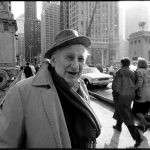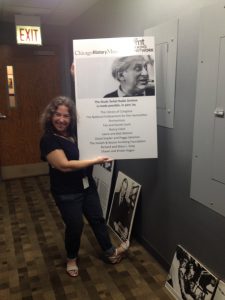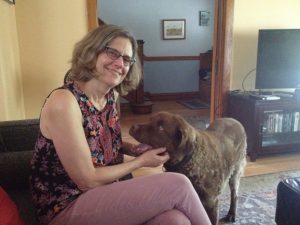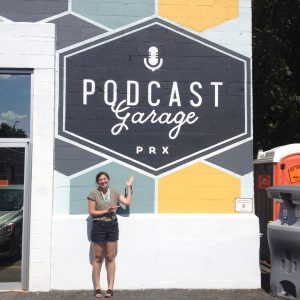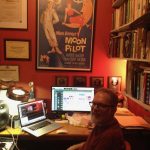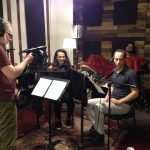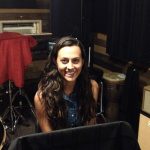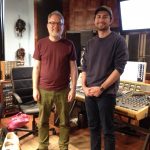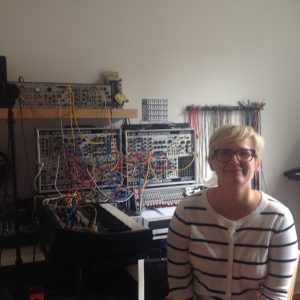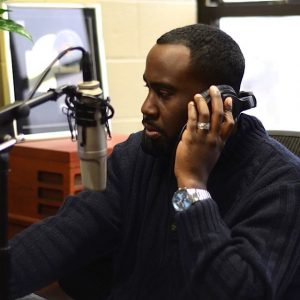My PhD project focuses on the transition from analogue to digital radio and how works of acoustic art relate to it. Thus, the development of the US-American podcast scene is of special interest for me, as it takes a leading role in the field. The term podcast was first coined in 2004 as a portmanteau of “iPod” and “broadcast” and referred originally to digitally produced and distributed audio programs on the internet, which were published periodically and could be subscribed to via RSS feed. As podcasting is still a rather new media phenomenon and the academic field of podcast studies is just about to emerge, I applied for the 2018 U.S. Embassy SANAS Travel Award to do field research. Altogether my journey lasted 14 days and covered ten interviews in five cities.
- Still in full-swing: The US-American podcasting boom.
- Traveling to the heart of its scene.
Due to its relevance for US-American radio history and the development of the podcast-scene, I started my research in Chicago. Thanks to the city’s geographic location, the first Chicago radio stations in the 1920s were listened to from the East coast to the Rockies and beyond. Needless to say, that Chicago emerged early on as a broadcasting center and a central switching point for transcontinental network lines, attracting various creative media people. One of them was the legendary radio host Louis “Studs” Terkel (1912 – 2008).
- Studs Terkel, © Chicago History Museum, iCHi-065438; Stephen Deutch, photographer
- Studs Terkel, © AP
To my great delight Allison Schein Holmes, archivist of the Studs Terkel Radio Archive, welcomed me at WMFT. The public radio station was the professional home of the ardent journalist, oral historian and Pulitzer Prize winner, who between 1952 and 1997 recorded more than 4’500 one-hour long conversations for his daily talk-show with interlocutors from all areas of American society, ranging from Rev. Martin Luther King Jr. or folk musician Pete Seeger to common Americans. As a political liberal Terkel discussed in his shows in particular topics like racism and the civil rights movement, women’s rights, organized labor, and last but not least music, especially jazz. Regarded as a national treasure trove of the U.S., the tapes of these interviews are being digitized by the Chicago History Museum and the Library of Congress, supported by a major fund of the National Endowment of the Humanities. In May 2018, after more than 20 years of preparation, the Studs Terkel Radio Archive has been launched online, providing the public free access to the first 200 interviews. In addition, this fall the archive will begin its podcast Bughouse Square, in which the writer Eve Ewing will regularly comment on her finds from the archive and discuss their relevance for the 21st century with various experts.
My second interlocutor in Chicago was Johanna Zorn, co-founder of the renowned Third Coast International Audio Festival. Established in 2001, the festival originally was affiliated with the Chicago public radio station WBEZ and was designed primarily for radio documentaries. In 2011 the main award of the festival was for the first time given to a podcast instead of a radio documentary, to the program “The Wisdom of Jay Thunderbolt” about a home strip club manager. Zorn recalls the sensation this podcast created back then: No-one of the jury members before had heard anything like it. Meanwhile, according to Zorn, public radio stations have very much opened up to the new aesthetics and the fresh sound of podcasting. At the same time, the podcasting boom exploded in 2014, when season one of the groundbreaking Serial took podcasting to the cultural mainstream, and the rise of the scene has not stopped yet. One of the interesting things about Serial is that it was the first podcast-only production of the famous Chicago radio show This American Life (TAL). It also can be regarded as a successor in the “Terkelian” tradition of giving ordinary people a voice and making them feel that they matter.
My next stop was Boston, because the headquarter of Public Radio Exchange (PRX), which plays a crucial role also for the podcasting movement and business, resides in Cambridge. Founded in 2003, PRX grew out of Jake Shapiro’s research on public radio, internet and entrepreneurialism at the Berkman Center for Internet and Society of Harvard University. The non-profit web-based platform is probably the largest on-demand catalogue of public radio programs. In 2014 PRX launched Radiotopia, a podcast network of currently 19 podcast shows, which are downloaded in total more than 13 million times each month. Unfortunately, all of the managers of PRX were at a meeting in New York City when I had my one-day stop-over in Boston. Thus, I decided to visit the Podcast Garage, PRX’s experimental podcast incubator. My decision proved to be very fruitful as its community manager Alex Braunstein gave me an excellent introduction to PRX and the concept and daily business of the Podcast Garage.
For my trip from Boston to NYC I rented a car: In preparation of my next appointments I wanted to visit Montauk and the Hamptons on Long Island, while listening intensely to several shows of the fiction podcast The Truth. Thus, I gained a better understanding of what it means to be “Banished to the Hamptons”, as the first episode of the new serial The Off-Season by the writer duo Marina & Nicco for The Truth is ironically titled. It is the story about a talk-show host who is outed on air for sexual harassment. According to the show’s motto that “fiction reveals truth that reality obscures”, the authors were inspired by the #metoo movement that revealed the severe misconduct of anchormen like Charlie Rose and Matt Lauer. Jonathan Mitchell, founder and creative head of The Truth, was so kind to allow me to delve into the production process over the course of one week. This allowed me to get a good look at what is going on behind the scene and to learn about how this particular segment of the NYC entertainment industry actually works. I attended writers’ meetings, a recording at the studio, an improv performance related to The Truth and spoke to writers, producers, actresses and actors.
- Jonathan Mitchell at his editing table
- Writer and actor Louis Kornfeld at the Magnet Training Center
- Writer duo Marina & Nicco
- Recording session for The Off-Season
- Actress Erica Hernandez
- Jonathan Mitchell and associate producer Davy Gardner
To get a more academic insight into the field of fiction podcast I met Ann Heppermann. She is an award-winning independent documentary producer, sound artist, and lecturer at Sarah Lawrence College in NYC. In 2016 Heppermann founded The Sarahs, the Sarah Lawrence College International Audio Fiction Award. The Sarahs wish to celebrate the best audio fiction currently made around the globe and thus also to push the development of the US-American (fiction) podcasting scene.
Despite generously sharing her sound knowledge, Heppermann drew my attention to Chenjerai Kumanyika and his latest merits for the podcast scene. Kumanyika, assistant professor of journalism and media studies at Rutgers University in New Brunswick, New Jersey, participated 2017 in two outstanding podcast productions that skillfully walk the line between journalism and scholarship: He was a regular guest on John Biewen’s Seeing White from the Center for Documentary Studies at Duke University about the discourse of “whiteness” in US-American society. Concurrently, together with journalist Jack Hitt he also was co-executive producer and co-host of Uncivil, the impressive first season on the untold stories of the Civil War and their aftermath, primarily the suppressed and neglected ones of people of color. Both podcasts were nominated for the prestigious Peabody Award; and Uncivil won it. The show is produced by Gimlet Media, a narrative podcasting company, which was founded in 2014 by Alex Blumberg, former TAL-producer, and manager Matthew Lieber. Gimlet plays a major role for “the ‘second age’ of podcasting” (Tiziano Bonini) as the company managed to successfully develop various business models for podcasting. When I contacted Kumanyika, he kindly agreed on the spot to meet at Rutgers University for an interview. This unplanned conversation certainly was a highlight among only very interesting and valuable encounters. At the moment, Uncivil is my favorite podcast due to its unique mixture of excellent research, sound historic knowledge, first-rate presentation and utmost relevance.
I would like to sincerely thank the U.S. Embassy in Switzerland and SANAS for awarding me this generous grant and for giving me the unique opportunity to research such an up-to-date topic on-site. And of course once again a big THANK YOU to all the wonderful people I had the great chance to meet on my trip, who took so much time to talk to me and generously shared their knowledge with me. All of you represent the best of America, of which I always will have the fondest memories. Take care.












